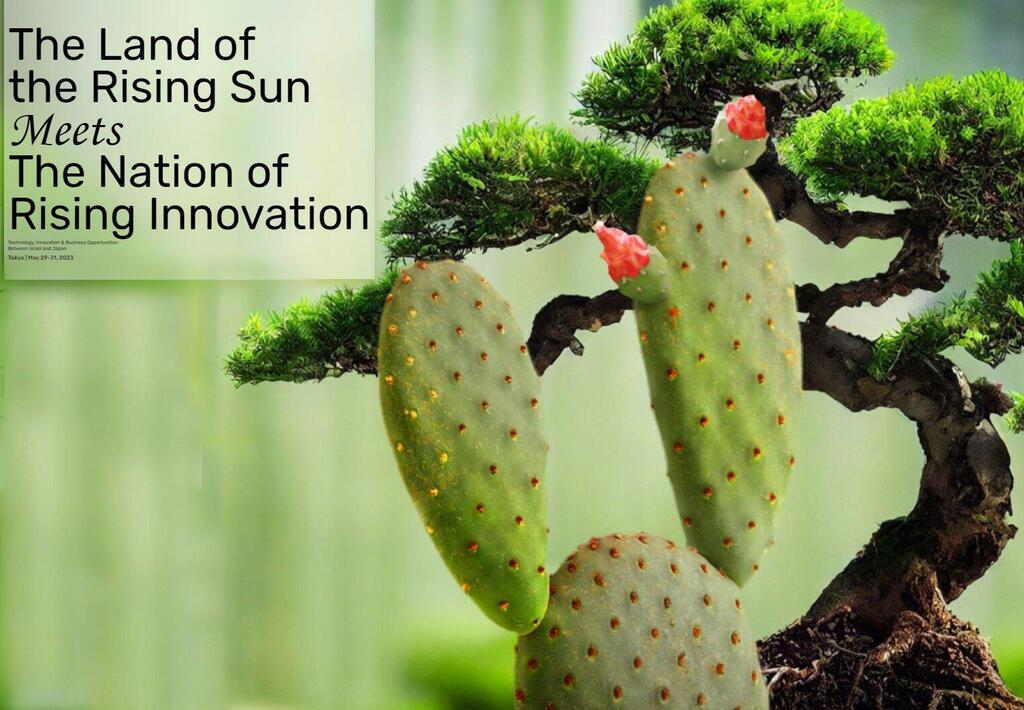
Israel-Japan Conference
"Japan has come to the point where promoting the startup ecosystem is the number one priority"
Yumiko Murakami, General Partner at MPower Partners, Japan’s first ESG VC fund, spoke with CTech ahead of the first-ever Japan-Israel conference hosted by Calcalist and Discount Bank in May
“I think that we are so different in terms of history, culture, mindset, and everything. But I think that we are so different that this creates opportunities to learn from each other,” Yumiko Murakami, General Partner at MPower Partners, Japan’s first ESG VC fund, told CTech.
Murakami joined CTech ahead of the first-ever Israel-Japan conference hosted by Calcalist and Discount Bank set to take place in May. As Israeli entrepreneurs and investors prepare to cross Asia and meet their Japanese counterparts, Murakami spoke on some of the challenges each country faces and how a more vital collaboration might help the two nations. Today, the fund has $150 million under management and has a portfolio of 10 companies - eight in Japan and two in Silicon Valley.
More details and registration: The Land of the Rising Sun meets The Nation of Rising Innovation Conference
“We are a global investor, we can invest in any country in any region,” she explained. “We have actually looked at some really interesting companies from Israel as well, but we have not made an investment yet. We continue to see interesting opportunities from the Israeli startup community.”
Israel and Japan may look like two countries that don’t share much in common: one has a flexible immigration policy promising a home for any Jewish person; the other appears homogeneous and isolationist to new migrants. One country has a ‘Startup Nation’ giving birth to hundreds of new and agile companies; the other nurtures large organizations entering their centennials. One has a high birth rate and a growing population; the other has been in steady decline for decades. The countries appear at odds in almost every way.
“Japan has launched a massive campaign to promote the startup ecosystem,” Murakami continued. “The government's role in the country… it has realized that the ecosystem in terms of startups can be and should be the engine for economic growth. You guys already have a pretty strong ecosystem when it comes to startups and there is a lot to be learned from our side in terms of what you've been able to do. And I think the government is looking to invite new blood from other countries.”
Murakami is the former head of the Organisation for Economic Co-Operation and Development (OECD) Tokyo Center, and before that worked for 20 years in the global financial industry as a Managing Director at Goldman Sachs in New York, London, and Tokyo. Today she sits on governmental advisory boards and helps run MPower Partners, a team of mostly female investors helping revitalize Japan’s venture ecosystem with an emphasis on globalization, diversity, and innovation.
“We have an advantage because we get to see more really interesting situations led by female or minority founders, and we actually think this is really one of the most interesting situations as female or minority founders tend to see things differently,” she said. “They see things in a different light versus 99% of their counterparts.” Currently, 40% of MPower Partners’ portfolio are female-founded companies.
Ties between Israel and Japan have remained generally strong despite a fall of almost 50% in investments in 2022 due to external factors such as the war in Ukraine and the end of the pandemic. Japan’s investment in Israel amounted to more than $1.5 billion, making up 12.8% of all foreign investments and 10% of the total investment in Israeli high-tech. The country has identified Startup Nation as an innovation hub that can help the country catch up and spot opportunities to help boost its economy as it faces an aging population with perceived restrictions in its immigration laws.
“In terms of the demographic challenge, we've been sitting on it for a long time,” Murakami explained. “There have been a lot of reports, it's just nothing has really worked well enough to see improvement in terms of birth rate.” Japan’s population stands at roughly 125 million - but it has been steadily declining over the last few decades and its fertility rate has fallen to a record low of 1.3, far below the 2.1 needed to maintain a stable population in the absence of immigration. It also has one of the oldest populations in the world due to its high life expectancy.
Israel, on the other hand, faces the opposite challenge. Its fertility rate is also declining but still resides within the Haredi community at 6.6 - making the country average almost 3 and well above what is needed to sustain population growth.
According to Murakami, the combination of low birth rates and an aging population has made Japan’s construction sector one of the country’s most hit industries as there are fewer young people to take on physically demanding jobs. MPower Partners addresses these challenges both directly and indirectly by investing in companies that can help alleviate these challenges, such as reskilling young women and minorities, or by investing in supply chain companies. One portfolio company, Sukedachi, provides a matching platform for construction companies and workers showing how these issues can also create business opportunities.
“The construction sector is one of the sectors where we see the most acute labor shortage because we don't have people, especially young people, and we don't have an open policy in terms of immigration,” she continued. “So what happens when you have a declining population, we just don't have enough young people to work or to hire from a company's perspective. There is a very, very severe shortage in pretty much every sector, but in particular, the construction sector is one of the most hit industries.”
In 2018, then-Prime Minister Shinzo Abe approved legislation to admit more foreign workers to the country to help face some of these challenges. That naturally was affected by the pandemic and five years later Fumio Kishida admitted the country is on the “brink” over its continued birth rate trends. One of the ways the country hopes to buck this trend is by making the country more appealing to foreign workers.
“I think they have a terrible reputation of being a very difficult country, I think that's true,” she said on Japan’s immigration and visa rules. “But I think that's one of the things that they have been working on, they have initiated programs to streamline a lot of these administrative steps that you would have to take if you were to migrate.”
Next month, VCs like MPower Partners will meet with Israeli entrepreneurs who will visit Tokyo for the first time and learn more about the country’s challenges and potential solutions. “The timing is really excellent because Japan actually has really come to the point where promoting the startup ecosystem is really the number one priority for economic growth,” she said. “This is an opportunity to really share best practices with probably the best ecosystems in the world, in terms of what we can learn in potential opportunities and in terms of working together.”
Israel’s diversity among its population - and the fact that anyone with one Jewish grandparent can immigrate to its shores - has resulted in a population with ancestors and cultures from Europe, the U.S., and many other places. Japan, on the other hand, has remained more homogeneous due to stricter immigration practices and self-imposed isolation. Its efforts to globalize its ecosystem and consider markets outside its own borders means it is taking on the Israeli growth mindset of starting companies with the aim to expand to international markets in their infancy.
“When you look at the demographic challenge that we're facing, it's really multifaceted. There are so many different sorts of situations that have been caused by demographic challenges. The labor shortage is one: that's a huge problem, and economic decline because of the fact that certain market segments in particular are shrinking. So there are just many different sorts of situations that have been caused because of the fact that we are in this country that is facing one of the fastest declining populations.”
Japan’s homogeneity and habit of remaining inside its own borders had been a blessing in the past - it helped the country obtain a high standard in products and services and an overall consistent quality management. This “interesting feature” brought with it success in consumer electronics, automobiles, and more recently Japanese products like whiskey. However, it appears the time has come for the country to swap this with a mindset more conducive to innovation, encouraging more open borders and a variety of thoughts and opinions to bring together more change.
Culture, business practices, and population trends in Israel and Japan have led both countries down different paths - providing both with separate rewards and challenges. However, as these nations continue to foster economic and social ties, the opposite problems they each face can come together to form compatible solutions. All this and more will be discussed in person at the conference set to explore some of these different approaches.
“The fact that you bring in this new sort of way of new perspectives, a new way of looking at things in terms of what we're looking for, from a Japan perspective, the timing is excellent,” Murakami concluded.
More details and registration: The Land of the Rising Sun meets The Nation of Rising Innovation Conference
















